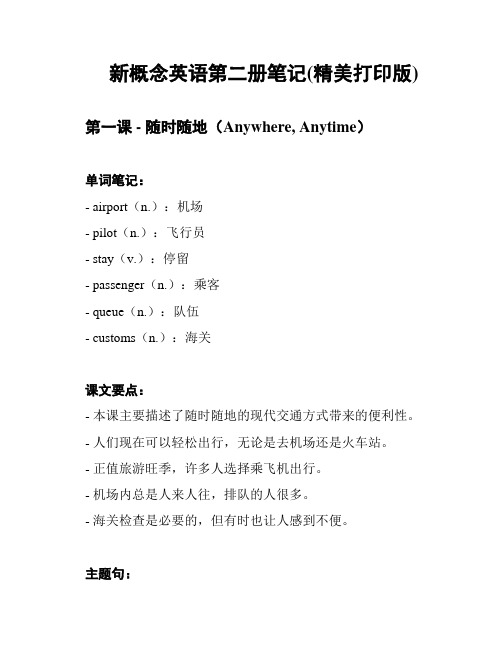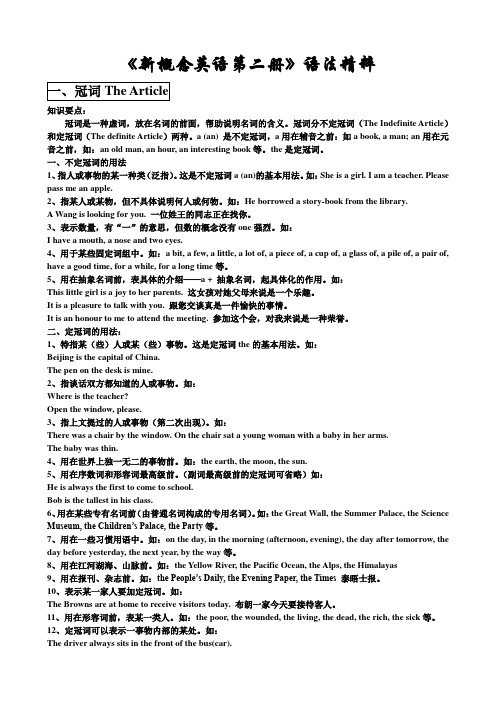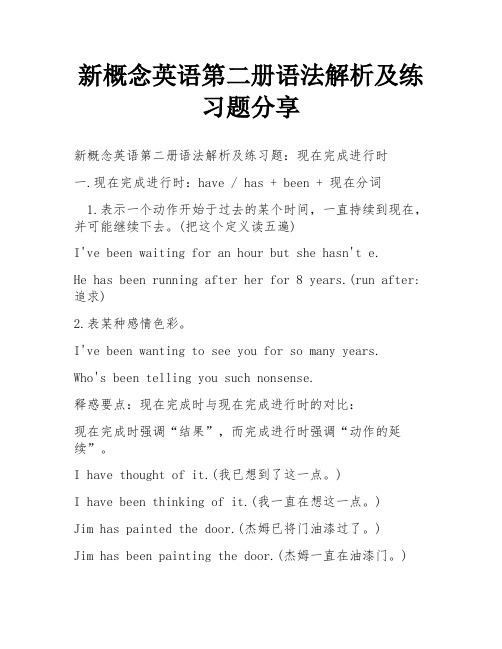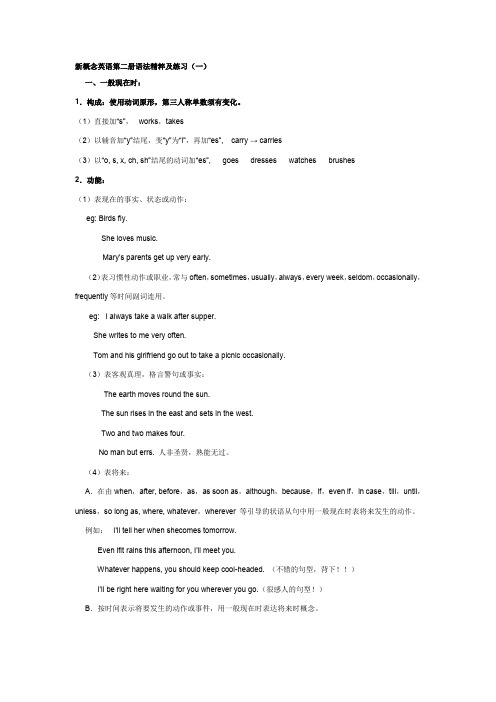(打印)新概念英语第二册语法精粹及练习
新概念英语第二册笔记(精美打印版)

新概念英语第二册笔记(精美打印版)第一课 - 随时随地(Anywhere, Anytime)单词笔记:- airport(n.):机场- pilot(n.):飞行员- stay(v.):停留- passenger(n.):乘客- queue(n.):队伍- customs(n.):海关课文要点:- 本课主要描述了随时随地的现代交通方式带来的便利性。
- 人们现在可以轻松出行,无论是去机场还是火车站。
- 正值旅游旺季,许多人选择乘飞机出行。
- 机场内总是人来人往,排队的人很多。
- 海关检查是必要的,但有时也让人感到不便。
主题句:现代交通方式的进步使我们能够随时随地旅行。
语法重点:- 本课中出现了一些现在进行时的句子,如:People are going to airports and railway stations.(人们正前往机场和火车站。
)- 该课还涉及到一些定冠词的用法,如:I like the customs officer.(我喜欢海关工作人员。
)- 其他值得注意的语法点包括人称代词的宾格形式、形容词比较级等。
第二课 - 奇怪的事(Something Strange)单词笔记:- strange(adj.):奇怪的- fly(v.):飞- cloud(n.):云- monster(n.):怪物- little(adj.):小的- eat(v.):吃- bird(n.):鸟课文要点:- 本课主要讲述了一个小男孩和他的奇怪经历。
- 有一天,男孩看到了一只怪物,它是一个身穿红色衣服、长着绿色头发和眼睛的生物。
- 怪物告诉男孩,他不会飞,但是他能飞到云中间。
- 然后,怪物吃了一些小鸟。
- 最后,怪物告诉男孩他会在树上等待,然后就飞走了。
主题句:男孩看到了一个奇怪的怪物,并与它进行了交谈。
语法重点:- 这篇课文中包含了一些过去式的动词,如:He ate five small birds.(他吃了五只小鸟。
新概念英语第二册语法精粹.doc

《新概念英语第二册》语法精粹知识要点:冠词是一种虚词,放在名词的前面,帮助说明名词的含义。
冠词分不定冠词(The Indefinite Article)和定冠词(The definite Article)两种。
a (an) 是不定冠词,a用在辅音之前:如a book, a man; an用在元音之前,如:an old man, an hour, an interesting book等。
the是定冠词。
一、不定冠词的用法1、指人或事物的某一种类(泛指)。
这是不定冠词a (an)的基本用法。
如:She is a girl. I am a teacher. Please pass me an apple.2、指某人或某物,但不具体说明何人或何物。
如:He borrowed a story-book from the library.A Wang is looking for you. 一位姓王的同志正在找你。
3、表示数量,有“一”的意思,但数的概念没有one强烈。
如:I have a mouth, a nose and two eyes.4、用于某些固定词组中。
如:a bit, a few, a little, a lot of, a piece of, a cup of, a glass of, a pile of, a pair of, have a good time, for a while, for a long time等。
5、用在抽象名词前,表具体的介绍——a + 抽象名词,起具体化的作用。
如:This little girl is a joy to her parents. 这女孩对她父母来说是一个乐趣。
It is a pleasure to talk with you. 跟您交谈真是一件愉快的事情。
It is an honour to me to attend the meeting. 参加这个会,对我来说是一种荣誉。
《新概念英语》第二册语法精粹-打印版

词名数可不�1 词名通普、2 � 。 词冠定加要,词名有专的成构词名通普由� 。等 setatS detinU eht ,anihC fo cilbupeR s’elpoeP eht ,reviR wolleY eht ,llaW taerG eht �2 �词冠加不�kcaJ ,moT ,nodnoL ,g nijieB ,napaJ ,anihC�1 �词名有专、1 �类种的词名、一 � 点 要 识知
。 语短 定固是.bs htiw drow a evah�词名数可不是 noitamrofni。题考高年 59 是题此 A、02 。 指 泛 , 所场 共公,secalp cilbup ,空二第。指特是固,语定有后空一第。题考高年 39 是题此 C、91 。词冠加不,语短定固是 deb ni。题考高年 29 是题此 D、81 。指特是应明发�题考高年 19 是题此 C、71 。数可不 ecaps�词冠定加应前 srats�题考高年 09 是题此 A、61 。词 名数可不是 cisum�词冠定加前器乐�题考高年 98 是题此 C、51 指泛 A、 4 1 。语短定固,饭吃在正 rennid ta 空一第 C、31 。好不绪情,语短定固是 空二第� 。指特是不此因,人个这识认 不都俩 们我,明 说里号 括� 。访来候 时的在 不您在 生先斯琼 位一有 指是空一第 D、21 。数可不 edart,空二第�绍介的体具表词名数可不 + a,空一第 A、11 C、 0 1 。语定有,指特空二第�词冠加不前目科,空一第 C、9 。词名数可不是 ecneics,空三第,指泛空二、一第 A、8 。词冠定加前词名的一唯的上界世及级高最词容形、脉山 B、7 。语短定固是 loohcs ot og A、6 。指泛。题考高年 58 为题此 A、5 。词名数可不是 rehtaew B、4 。na 用前音元 D、3 。 ”�“量数表且 ,指泛是仍空二第�现出次一第,指泛是空一第,意句据根。题考高年 79 为题此 D、2 。词名数可不是 ria B、1 � 】案 答【 a ;na�D emos ;em os�Cemos ;na�Ba ;em os�A .lufpleh eb thgim eH .reganam eht htiw drowevah dluoc uoy ,lleW—— .esaelp ,letoh ruoy fo tnem eganam eht tuoba noitam rofniekil d’I——、02 eht ;×�D× ;eht�C×;×�Beht ;eht�A .secalp cilbupni sgniht yllis g nitirw fo tibahni llits era elpoep ynaM、91 eht ;×�D× ;eht�Ceht ;eht�B×;×�A .moorhtabni eb ts uj thgim eh tub ,debni llits s’eh kniht I—— ?kcaJ s’erehW——、81 eno�Deht�Ca�B×�A .6781 ni enohpeletdetnevni lleB maharG rednaxelA、71 eht ;eht�D×;×�Ceht ;×�B× ;eht�A .ecapstub gnihton was tuanortsa eht ,sratsdnoyeB、61 eht ;eht�D× ;eht�C×;×�Beht ;×�A .cisumot gninetsil ni detseretni si yrneH elihw onaipgniyalp fo dnof si ecilA、51 na�Da�Ceht�B×�A ?yub ot tnaw uoy od rac fo dnik tahw、41 a ;a�Da;×�C×;×�Beht ;a�A .eno suociledsaw tI .neht rennidta erew yehT、31 a ;A �Deht ;ehT �C ×;A �Ba; × �A.repmet dab ni s aw eH .)nam siht swonk su fo rehtien( tuo erew uoy elihw dellac senoJ rM__、21 eht ;×�Deht ;eht�Cna ;eht�B×;a�A .yadot edart lanoitanretnini tsum a si hsilg nE fo egdelwonk__ taht eerga elpoep ynaM、11 a ;eht ;A�Deht ;eht ;ehT�C×;×;ehT�Ba ;na ;A�A .tsewni stes dna tsaeni sesir nus、01 a ;A�Deht ;×�C× ;×�B× ;ehT�A .ygrene dna rettam fo ecneicssi scisyhP、9 a ;eht ;a�D× ;eht ;×�Ceht ;× ;eht�B× ;a ;a�A
新概念英语第二册语法解析及练习题分享

新概念英语第二册语法解析及练习题分享新概念英语第二册语法解析及练习题:现在完成进行时一.现在完成进行时:have / has + been + 现在分词1.表示一个动作开始于过去的某个时间,一直持续到现在,并可能继续下去。
(把这个定义读五遍)I've been waiting for an hour but she hasn't e.He has been running after her for 8 years.(run after: 追求)2.表某种感情色彩。
I've been wanting to see you for so many years.Who's been telling you such nonsense.释惑要点:现在完成时与现在完成进行时的对比:现在完成时强调“结果”,而完成进行时强调“动作的延续”。
I have thought of it.(我已想到了这一点。
)I have been thinking of it.(我一直在想这一点。
)Jim has painted the door.(杰姆已将门油漆过了。
)Jim has been painting the door.(杰姆一直在油漆门。
)练习:1. They ________ us since five o'clock this morning.A. are helpingB. have been helpingC. have been helpedD. have helped2. I ________ the book the whole day, yet I haven't finished it.A. have been readingB. have readC. am readingD. had been reading3. Please e in. We ________ about your paper.A. talkB. had been talkingC. have been talkingD. would have talked4. Such natural resources as coal and petroleum________.A. gradually are exhaustedB. are being gradually exhaustedC. have gradually exhaustingD. have been exhausting gradually5. It ________ almost every day so far this month.A. is rainingB. rainedC. rainsD. has been raining用所给动词正确时态填空。
《新概念英语》第二册语法精粹含答案

《新概念英语》第二册语法精粹(含答案)一、冠词The Article【专项训练】:1、We can’t live without air.A.an B.×C.the D.some 2、——Have you seen pen? I left it here this morning.——Is it black one? I think I saw it somewhere.A.a; the B.the; the C.the; a D.a; a3、I’ve been waiting for him for hour and half. A.×; ×B.the; a C.a; the D.an; a4、What fine weather we have today!A.a B.×C.some D.an5、Have you ever seen as tall as this one?A.a tree B.such tree C.an tree D.tree 6、Children usually go to school at age of six. A.×; the B.a; an C.the; ×D.the; the 7、Himalayas is highest mountain in world. A.×; the;×B.The; the; the C.A; a; a D.×;×;×8、They each have __book. Li Hua’s is about writer. Wang Lin’s is on science.A.a; a; ×B.the; ×; the C.×; the; ×D.a; the; a9、Physics is science of matter and energy. A.The; ×B.×; ×C.×; the D.A; a 10、sun rises in east and sets in west. A.A; an; a B.The;×;× C.The; the; the D.A; the; a11、Many people agree that__knowledge of English is a must in international trade today.A.a;×B.the; an C.the; the D.×; the 12、__Mr Jones called while you were out (neither of us knows this man). He was in badtemper. A.×;a B.A;×C.The; the D.A; a13、They were at dinner then. It was delicous one.A.a; the B.×;×C.×;a D.a; a14、what kind of car do you want to buy?A.×B.the C.a D.an15、Alice is fond of playing piano while Henry is interested in listening to music.A.×; the B.×;×C.the; ×D.the; the16、Beyond stars, the astronaut saw nothing butspace.A.the; ×B.×; the C.×;×D.the; the 17、Alexander Graham Bell invented telephone in 1876.A.×B.a C.the D.one 18、——Where’s Jack?——I think he’s still in bed, but he might just be in bathroom.A.×;×B.the; the C.the; ×D.×; the 19、Many people are still in habit of writing silly things in public places.A.the; the B.×;×C.the; ×D.×; the 20、——I’d like information about the management of your hotel, please.——Well, you could have word with the manager. He might be helpful.A.some; a B.an; some C.some; some D.an; a【答案】:1、B air是不可数名词。
新概念英语第二册语法解析及练习题

新概念英语第二册语法解析及练习题•相关推荐新概念英语第二册语法解析及练习题新概念英语第二册语法解析及练习题1过去完成时:had +过去分词1.表示过去某个动作或某个具体时间之前已经发生、完成的动作。
“过去的过去”。
● They had got everything ready before I came.● The play had begunbefore I got to the theater with my boyfriend.2.过去完成时常用于hardly / scarcely ... when, no sooner ... than等固定句型结构中。
(此乃超级重点句型,意为:“一……就”)● She had hardly / scarcely gone to bed when the bell rang.● No sooner had he arrived at the railway station than he met her parents.(注意no sooner在句首时句型倒装。
)3.intend(打算),mean(意味),hope(希望),want(想要),plan(计划)等动词的'过去完成时用来表示本打算做而没有做的事。
● I had intended to call on you yesterday, but someone came to see me just when I was about to leave.(……原想昨天去看你……)● They had planed to hold a football mat ch last week, but they had to cancel it because the bad weather.(……原计划上周举行一场足球赛……)练习:1. -Let's hurry! The president is coming. -Oh, I was afraid that we ________.A. already miss himB. had already missed himC. will miss him alreadyD. have already missed him2. Your letter came just as I ________ my office.A. was leavingB. would leaveC. had leftD. left3. I ________ my keys, I can't remember where I last sawthem.A. was losingB. lostC. had lostD. have lost4. Nobody knew where the teacher ________.A. has goneB. would have goneC. had goneD. would be gone5. The sportsmen ________ training for 3 hours when the coach told them to break off for rest.A. have beenB. areC. had beenD. were答案:1. B2. A3. D4. C5. C新概念英语第二册语法解析及练习题2过去将来进行时:should / would be +现在分词表示从过去某时看将来某时正在进行的动作。
高一英语《新概念英语第二册》语法精粹(含习题) 名词性从句

《新概念英语第二册》语法精粹知识要点:1、熟悉并掌握各个连接词、关系代词和连接副词的用法。
2、熟悉并掌握复合句即名词性从句〔主语从句、宾语从句、表语从句、同位语从句〕,定语从句和状语从句。
什么叫复合句:由一个主句和一个或一个以上的从句构成的句子叫复合句。
在复合句中主句是全句的主体,从句是全句的一个成分,不能独立。
从句通常是用关联词来引导的。
在这里关联词还起联系从句和主句的作用。
主从复合句〔Complex Sentences〕一、从句的种类:注:以it作形式主语,把主语从句后置的常用的句型有:〔1〕It + be + 形容词 + that从句〔2〕It + be + 名词词组 + that从句〔3〕It + be + 过去分词 + that从句〔4〕It seem, happen等不与物动词 + that从句二、常用的关联词1、主语从句:2、宾语从句:3、表语从句:4、同位语从句:名词性从句包括四种从句即主语从句、表词从句、宾语从句和同位词从句。
名词性从句的特点:that 、who、 whom、 what 、whether与 when、 where引导名词性从句时必须是陈述句词序:1、主词从句:That light travels in straight line is known to all .(That 引导主语从句不可省) When t he plan is to take off hasn’t been announced .主语从句通常以it 做形主语出现It was my fault that I had him play foatball all faternoon.It is important that we should go to the school to talk with the teacher.2、表语从句,即名词性从句放在表语位置就是表语从句,需要注意的,主语是 reason时,表语要用that引导而不是because.The reason why he was late was that he missed the train by one minute this morning .3、宾语从句that 常可以省略,并且注意时态呼应,当主句为过去时时,从句时态一定往前推移,不可出现现在时或现在完成时。
新概念英语第二册语法精粹及练习

新概念英语第二册语法精粹及练习(一)一、一般现在时:1.构成:使用动词原形,第三人称单数须有变化。
(1)直接加“s”,works,takes(2)以辅音加“y”结尾,变“y”为“i”,再加“es”,carry → carries(3)以“o, s, x, ch, sh”结尾的动词加“es”, goes dresses watches brushes2.功能:(1)表现在的事实、状态或动作:eg: Birds fly.She loves music.Mary's parents get up very early.(2)表习惯性动作或职业,常与often,sometimes,usually,always,every week,seldom,occasionally,frequently等时间副词连用。
eg: I always take a walk after supper.She writes to me very often.Tom and his girlfriend go out to take a picnic occasionally.(3)表客观真理,格言警句或事实:The earth moves round the sun.The sun rises in the east and sets in the west.Two and two makes four.No man but errs. 人非圣贤,熟能无过。
(4)表将来:A.在由when,after, before,as,as soon as,although,because,if,even if,in case,till,until,unless,so long as, where, whatever,wherever 等引导的状语从句中用一般现在时表将来发生的动作。
例如:I'll tell her when shecomes tomorrow.Even ifit rains this afternoon, I'll meet you.Whatever happens, you should keep cool-headed. (不错的句型,背下!!)I'll be right here waiting for you wherever you go.(很感人的句型!)B.按时间表示将要发生的动作或事件,用一般现在时表达将来时概念。
- 1、下载文档前请自行甄别文档内容的完整性,平台不提供额外的编辑、内容补充、找答案等附加服务。
- 2、"仅部分预览"的文档,不可在线预览部分如存在完整性等问题,可反馈申请退款(可完整预览的文档不适用该条件!)。
- 3、如文档侵犯您的权益,请联系客服反馈,我们会尽快为您处理(人工客服工作时间:9:00-18:30)。
新概念英语第二册语法精粹及练习(一)新概念二册语法精粹一、一般现在时一、一般现在时:1.构成:使用动词原形,第三人称单数须有变化。
(1)直接加“s”,works,takes(2)以辅音加“y”结尾,变“y”为“i”,再加“es”,carry → carries(3)以“o, s, x, ch, sh”结尾的动词加“es”, goes dresses watches brushes2.功能:(1)表现在的事实、状态或动作:eg: Birds fly.She loves music.Mary's parents get up very early.(2)表习惯性动作或职业,常与often,sometimes,usually,always,every week,seldom,occasionally,frequently等时间副词连用。
eg: I always take a walk after supper.She writes to me very often.Tom and his girlfriend go out to take a picnic occasionally.(3)表客观真理,格言警句或事实:The earth moves round the sun.The sun rises in the east and sets in the west.Two and two makes four.No man but errs. 人非圣贤,熟能无过。
(4)表将来:A.在由when,after, before,as,as soon as,although,because,if,even if,in case,till,until,unless,so long as, where, whatever,wherever 等引导的状语从句中用一般现在时表将来发生的动作。
(黄金重点,所有考试都不放过它!)例如:I'll tell her when she comes tomorrow.Even if it rains this afternoon, I'll meet you.Whatever happens, you should keep cool-headed. (不错的句型,背下!!)I'll be right here waiting for you wherever you go.(很感人的句型!)B.按时间表示将要发生的动作或事件,用一般现在时表达将来时概念。
The play begins at 6:30 this evening.When does the plane take off?He leaves for that city next week.According to the timetable, the express train to Shanghai starts at nine in the morning.(按照时刻表,开往上海的特快列车早上7 点出发。
)测试精编1. The Browns ________ a nice car and Brown's brother ________ a nice jeep.A. have / haveB. has / hasC. have / hasD. has / have2. If their house ________ not like ours, what ________ it look like?A. is / isB. is / doesC. does / doesD. does / is3. - ________ you think he will come? - If it ________ tomorrow, he will not come.A. Do / rainsB. Are / rainsC. Do / will rainD. Are / will rain4. The little child ________ not even know that the moon ________ around the earth.A. do / moveB. do / movesC. does / movesD. did / moved5. Many a student ________ fond of films, but a good student seldom ________ to the cinemaA. are / goesB. is / goesC. are / goD. is / go新概念英语第二册语法精粹及练习(二)新概念二册语法精粹二、现在进行时:is / am / are + 现在分词1.表示现在正在进行的动作。
如The kettle is boiling. Shall I make tea?Don't you think you eat too much? You're putting on weight(体重增加)。
The workers are building a new bridge across the river.2.表现阶段正进行的动作。
He is taking physics this semester(本学期)。
Weare preparing for our final examination this week.3.go, come, leave, arrive, land, meet, die, start, return, join, etc. 用于进行时态时表示即将开始的动作。
Look! The bus is coming.看!车来了!The old man is seriously ill, and he is dying.Alice is leaving for Beijing with her mother.4.与always, forever, continually, constantly 等副词连用,表示说话人带有感*彩:赞赏或厌恶。
He is always thinking of others.(他总是想着别人。
)The boy is continually making noises.(这男孩不断地发出吵闹声。
)The teacher is constantly (always) criticizing her for being late.(老师一直在批评她迟到。
)5.下面表示状态、感觉、情绪、精神活动的动词不可用于进行时。
(此条戒律请背10遍!!!)believe(相信),doubt(怀疑),see(看见),hear(听见),know(知道),understand (理解),belong(属于),think(认为),consider(认为),feel(觉得),look(看起来),seem(看上去),show (显示),mind(介意),have(有),sound(听起来),taste(尝起来),require(要求),possess(拥有),care(关心),like(喜欢),hate(讨厌),love(喜爱),detest(憎恨),desire(意欲)【简单记忆】:● 永远不要说I'm believing...或He is seeing a house. 再简单一点说,这些动词后面不要随意加-ing.● 可怕的是:我们在写作及口语中常犯此类大错!● 注意:have a party / think about可以用进行时,因为这里have意为“举行”;think意为“考虑”。
测试精编:1. How can you ________ If you are not ________ ?A. listening / hearingB. hear / listeningC. be listening / heardD. be hearing / listening to2.The girl even won't have her lunch before she ________ her homework.A. will finishB. is finishingC. had finishedD. finishes3. Those who have applied for the post(职位)________ in the office.(此题超前)A. are being interviewedB. are interviewingC. interviewingD. to be interviewing4. The old scientist ________ to do more for the country.A. is wishingB. has been wishingC. wishesD. has been wished5. If he ________, don't wake him up.A. still sleepsB. is still sleepingC. still has been sleepingD. will be sleeping still新概念英语第二册语法精粹及练习(三)新概念英语第二册语法精粹(三)一般过去时。
1.表示过去某个特定时间或某一段时间发生的动作或情况。
We visited the school last spring.I went to school by bike when I was in middle school.China was founded in 1949.2.在表示时间或条件等的状语从句中代替过去将来时。
(参)She told me that she would not go with us if it rained the next day.They would not leave until she came back.My friend promised to marry me once she made her final decision.3.一般过去时,现在时和过去时的几组差异:(别以为这很简单,下面的差异你不一定明白。
)● Her brother was a chemist.(已去世)● Her brothe r is a chemist.(尚健在)● That's all I had to say.(话已说完)● That's all I have to say.(言之未尽)● It was so nice to see you.(离别时用)● It is so nice to see you.(见面时用)● Jane did a lot of work this morning.(已是当天下午或晚上)● Jane has done a lot of work this morning.(仍是上午)[本句现在完成时,此乃后话!]测试精编I:(用所给动词的正确进态填空)。
